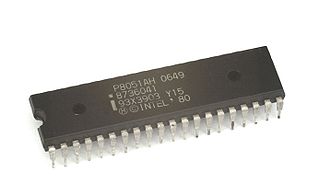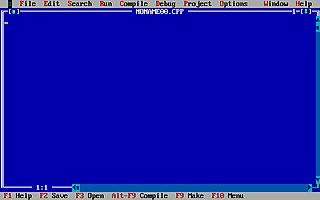Forth is a procedural, stack-oriented programming language and interactive environment designed by Charles H. "Chuck" Moore and first used by other programmers in 1970. Although not an acronym, the language's name in its early years was often spelled in all capital letters as FORTH. The FORTH-79 and FORTH-83 implementations, which were not written by Moore, became de facto standards, and an official standardization of the language was published in 1994 as ANS Forth. A wide range of Forth derivatives existed before and after ANS Forth. The free software Gforth implementation is actively maintained, as are several commercially supported systems.
Pascal is an imperative and procedural programming language, designed by Niklaus Wirth as a small, efficient language intended to encourage good programming practices using structured programming and data structuring. It is named after French mathematician, philosopher and physicist Blaise Pascal.

UCSD Pascal is a Pascal programming language system that runs on the UCSD p-System, a portable, highly machine-independent operating system. UCSD Pascal was first released in 1977. It was developed at the University of California, San Diego (UCSD).
Turbo Pascal is a software development system that includes a compiler and an integrated development environment (IDE) for the Pascal programming language running on CP/M, CP/M-86, and DOS. It was originally developed by Anders Hejlsberg at Borland, and was notable for its extremely fast compilation. Turbo Pascal, and the later but similar Turbo C, made Borland a leader in PC-based development.

The Intel MCS-51 is a single chip microcontroller (MCU) series developed by Intel in 1980 for use in embedded systems. The architect of the Intel MCS-51 instruction set was John H. Wharton. Intel's original versions were popular in the 1980s and early 1990s, and enhanced binary compatible derivatives remain popular today. It is a complex instruction set computer, but also has some of the features of RISC architectures, such as a large register set and register windows, and has separate memory spaces for program instructions and data.

The Intel 8085 ("eighty-eighty-five") is an 8-bit microprocessor produced by Intel and introduced in March 1976. It is software-binary compatible with the more-famous Intel 8080 with only two minor instructions added to support its added interrupt and serial input/output features. However, it requires less support circuitry, allowing simpler and less expensive microcomputer systems to be built. The "5" in the part number highlighted the fact that the 8085 uses a single +5-volt (V) power supply by using depletion-mode transistors, rather than requiring the +5 V, −5 V and +12 V supplies needed by the 8080. This capability matched that of the competing Z80, a popular 8080-derived CPU introduced the year before. These processors could be used in computers running the CP/M operating system.

Delphi is a general-purpose programming language and a software product that uses the Delphi dialect of the Object Pascal programming language and provides an integrated development environment (IDE) for rapid application development of desktop, mobile, web, and console software, currently developed and maintained by Embarcadero Technologies.
The PL/M programming language (an acronym of Programming Language for Microcomputers) is a high-level language conceived and developed by Gary Kildall in 1973 for Hank Smith at Intel for its microprocessors.
Object Pascal is an extension to the programming language Pascal that provides object-oriented programming (OOP) features such as classes and methods.

Free Pascal Compiler (FPC) is a compiler for the closely related programming-language dialects Pascal and Object Pascal. It is free software released under the GNU General Public License, with exception clauses that allow static linking against its runtime libraries and packages for any purpose in combination with any other software license.

Punter is a protocol for file transfer developed in the 1980s by Steve Punter. There are various types of Punter such as PET Transfer Protocol (PTP), C1 and C2.

Visual Prolog, previously known as PDC Prolog and Turbo Prolog, is a strongly typed object-oriented extension of Prolog. As Turbo Prolog, it was marketed by Borland but it is now developed and marketed by the Danish firm PDC that originally created it. Visual Prolog can build Microsoft Windows GUI-applications, console applications, DLLs, and CGI-programs. It can also link to COM components and to databases by means of ODBC.
The computer programming languages C and Pascal have similar times of origin, influences, and purposes. Both were used to design their own compilers early in their lifetimes. The original Pascal definition appeared in 1969 and a first compiler in 1970. The first version of C appeared in 1972.
IP Pascal is an implementation of the Pascal programming language using the IP portability platform, a multiple machine, operating system and language implementation system. It implements the language "Pascaline", and has passed the Pascal Validation Suite.
This is an incomplete list of assemblers: computer programs that translate assembly language source code into binary programs. Some assemblers are components of a compiler system for a high level language and may have limited or no usable functionality outside of the compiler system. Some assemblers are hosted on the target processor and operating system, while other assemblers (cross-assemblers) may run under an unrelated operating system or processor. For example, assemblers for embedded systems are not usually hosted on the target system since it would not have the storage and terminal I/O to permit entry of a program from a keyboard. An assembler may have a single target processor or may have options to support multiple processor types. Very simple assemblers may lack features, such as macros, present in more powerful versions.

Turbo C++ is a discontinued C++ compiler and integrated development environment originally from Borland. It was designed as a home and hobbyist counterpart for Borland C++. As the developer focused more on professional programming tools, later Turbo C++ products were made as scaled down versions of its professional compilers.

The Borland Graphics Interface, also known as BGI, was a graphics library bundled with several Borland compilers for the DOS operating systems since 1987. BGI was also used to provide graphics for many other Borland products including the Quattro Pro spreadsheet.
Each time Intel launched a new microprocessor, they simultaneously provided a system development kit (SDK) allowing engineers, university students, and others to familiarise themselves with the new processor's concepts and features. The SDK single-board computers allowed the user to enter object code from a keyboard or upload it through a communication port, and then test run the code. The SDK boards provided a system monitor ROM to operate the keyboard and other interfaces. Kits varied in their specific features but generally offered optional memory and interface configurations, a serial terminal link, audio cassette storage, and EPROM program memory. Intel's Intellec development system could download code to the SDK boards.
Pic Micro Pascala.k.a. PMP is a free Pascal cross compiler for PIC microcontrollers. It is intended to work with the Microchip Technology MPLAB suite installed; it has its own IDE (Scintilla-based) and it is a highly optimized compiler.

The Infineon XC800 family is an 8-bit microcontroller family, first introduced in 2005, with a dual cycle optimized 8051 "E-Warp" core. The XC800 family is divided into two categories, the A-Family for Automotive and the I-Family for Industrial and multi-market applications.










